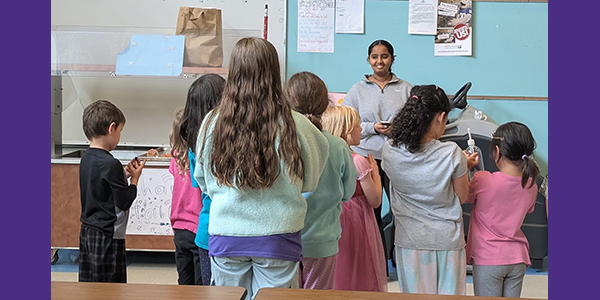The 2024-2025 academic year brought a new collaboration between the Department of Bioengineering and AVELA – A Vision for Engineering Literacy & Access. AVELA leads culturally responsive workshops designed to inspire and educate students from all backgrounds, especially those who have been historically underrepresented in STEM. Initially launched in 2019 as a student organization at the University of Washington, it is now an independent non-profit.
AVELA has a growing national reach and includes a very active student chapter at UW. They teach workshops for middle and high school students across Washington state, as well as supporting scholarship nights, mentorship programs, new course development, and one-day workshops like a recent Women in Data Science event sponsored by T-Mobile.
The Institute for Stem Cell & Regenerative Medicine – which is led by Bioengineering Professor Jennifer Davis and includes more than 10 Bioengineering faculty members – has also supported the program for three years.
The 2024-2025 workshops were led by 27 undergraduate and graduate students from across campus. They reached more than 240 K-12 students in the Seattle area and delivered hundreds of hours of content.

“Growing up in The Gambia, I never had mentors or exposure to STEM in that way. AVELA gave me that,” said Isatou Barrow, an undergraduate student and one of AVELA’s Co-Presidents at UW for 2025-2026. “I’m fulfilling a purpose that I’ve always wanted to and paying it forward.”
According to Kyle Johnson, a PhD candidate in Computer Science and Engineering who founded AVELA: “The chapter here [at UW] serves as a model. They are adapting and working with partners to give those underserved in our communities what they need, meeting them where they are – adjusting curriculum and projects to accomplish that. The workshops are co-designed and co-created.”
The workshops taught by AVELA members cover various disciplines through fun-filled experiments, inspiring middle and high school students to consider attending college and pursue majors related to the biological sciences. Topics for the workshops include the immune system, the role of gas exchange in respiration, the electrical pathways of the heart, and gel electrophoresis.
Kids at the Sacajawea Boys & Girls Club, for example, built a model using plastic bottles, balloons, and straws to illustrate how lungs function and how the diaphragm helps inhalation and exhalation. The Ben Franklin Boys & Girls Club, meanwhile, acted out the roles of phagocytes, T-cells, and B-cells to simulate how the body responds to pathogens.
AVELA members are learning important lessons as well.
“Sometimes students graduate from a program and run face-first into a concrete wall. So we want them to see how systems and institutions work,” Johnson said. “The organizational leadership skills [that AVELA members develop] can be the difference between having a job after college and not. We want them doing the work, and we want to be transparent about what this work entails.”



